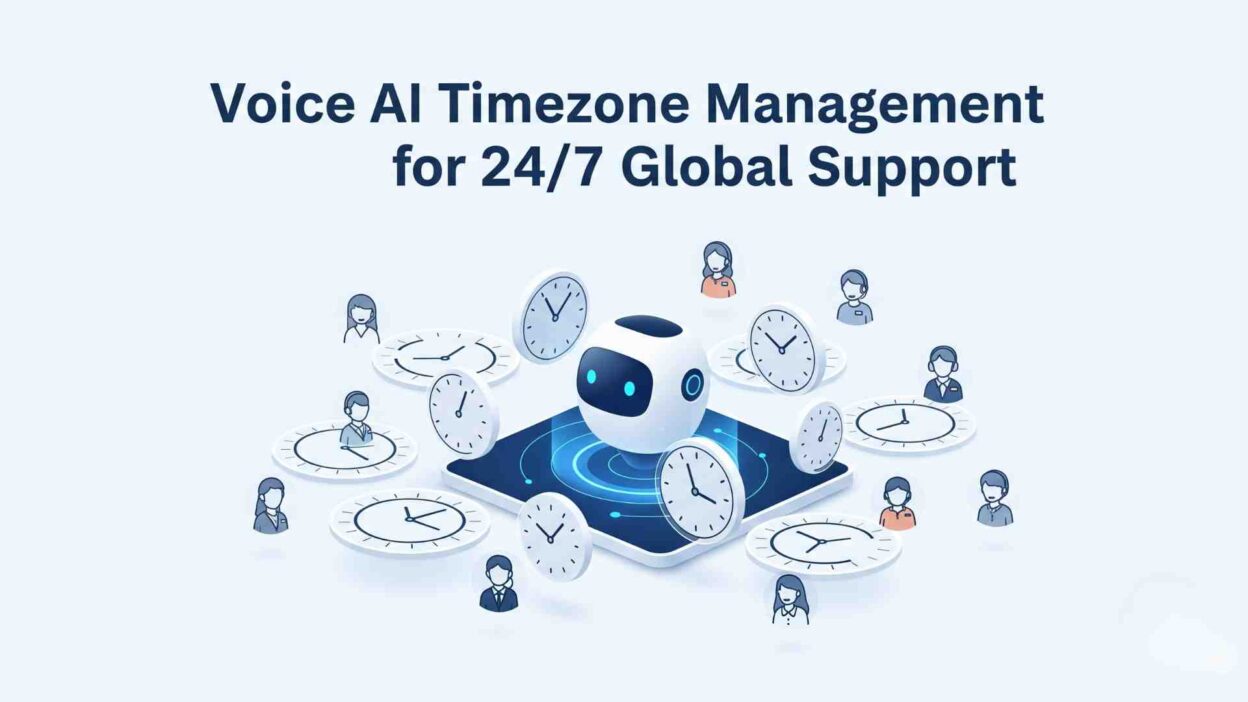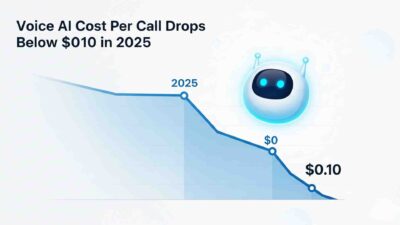TL;DR Voice AI timezone management transforms how global support automation delivers seamless customer service across international boundaries. Modern businesses struggle to provide consistent support quality when customers span multiple continents and time zones. Traditional human-staffed support centers cost millions annually while still leaving coverage gaps during off-peak hours.
Table of Contents
International AI systems solve these challenges by maintaining consistent service levels regardless of local time constraints. Companies achieve true 24/7 operations without the massive overhead of maintaining multiple regional support centers. Customer satisfaction improves dramatically when voice AI handles timezone complexities automatically.
The Hidden Reality of Global Support Timezone Challenges
Most companies underestimate the complexity of managing customer expectations across different time zones. Support teams face constant pressure to respond quickly regardless of local business hours. Customers expect immediate assistance even when calling from opposite sides of the globe.
Traditional solutions require expensive staff rotations and multiple office locations to maintain coverage. Night shift premiums and weekend overtime costs drain support budgets rapidly. Staff burnout increases significantly when teams work irregular hours to cover global support needs.
Voice AI timezone management eliminates these problems by operating continuously without human limitations. Systems adapt conversation styles based on local business customs and time expectations. Customers receive appropriate responses whether calling during local business hours or late at night.
What Global Support Automation Delivers
Modern voice AI systems process thousands of simultaneous conversations across multiple time zones without performance degradation. Natural language processing adapts to regional dialects and cultural communication preferences automatically. Real-time translation capabilities enable support in 100+ languages without human interpreter costs.
Intelligent routing directs complex issues to human agents during appropriate business hours while handling routine inquiries automatically. Escalation protocols consider timezone differences when scheduling callbacks and follow-up interactions. Customer data synchronizes globally to ensure consistent service history regardless of interaction time or location.
International AI Performance Across Time Zones
Advanced neural networks maintain consistent response quality whether processing morning rush inquiries or midnight emergency calls. Machine learning algorithms optimize response patterns based on timezone-specific customer behavior data. Performance metrics remain stable across all time zones without the quality degradation typical of human night shift operations.
Voice AI systems handle volume spikes during different regional business hours without requiring additional infrastructure. Automatic scaling adjusts processing capacity based on global support demand patterns. Response times stay under 30 seconds regardless of concurrent user volumes or geographic distribution.
Technical Architecture for Global Voice AI Support
Cloud-based infrastructure distributes processing power across multiple geographic regions to minimize latency. Edge computing solutions provide faster response times by processing customer interactions closer to their physical location. Redundant systems ensure continuous operation even when regional data centers experience maintenance or outages.
Real-time synchronization keeps customer data current across all global support channels. Security protocols protect sensitive customer information while enabling seamless handoffs between automated and human support agents. Compliance frameworks ensure voice AI operations meet regulatory requirements in all operational jurisdictions.
The Economics of 24/7 Voice AI Support Operations
Implementing comprehensive voice AI timezone management costs 60-80% less than equivalent human staffing across multiple time zones. Initial system development requires $2-5 million investment, depending on language support and feature complexity. Annual operational costs average $500,000-1.2 million compared to $15-25 million for human global support teams.
Return on investment typically occurs within 12-18 months through reduced staffing costs and improved customer satisfaction. Volume handling capacity scales without proportional cost increases, unlike human-staffed support centers. Premium support tier pricing becomes viable when voice AI enables consistent high-quality service delivery.
Cost Comparison: Voice AI vs Traditional Global Support
Human global support requires a minimum of 15-20 agents per timezone for basic coverage levels. Annual salary and benefit costs range from $45,000 to 85,000 per agent, depending on regional labor markets. Training costs add $8,000-15,000 per agent annually for ongoing skill development and system updates.
Voice AI timezone management eliminates recurring salary expenses while providing superior coverage consistency. Infrastructure costs scale predictably with usage volumes rather than fixed staffing requirements. Technology refresh cycles cost significantly less than continuous human recruitment and training programs.
Revenue Impact of Improved Global Support
Customer retention rates improve by 25-40% when voice AI provides consistent support quality across all time zones. Average resolution times decrease by 45-60% when AI handles routine inquiries automatically. Customer lifetime value increases when support experiences remain consistently positive regardless of contact timing.
Market expansion becomes feasible when voice AI eliminates the need for regional support infrastructure investment. International sales grow when customers receive reliable support in their local languages and time zones. Premium pricing strategies succeed when quality differentiates brands from competitors using traditional support models.
Real-World Implementation Success Stories
E-commerce giants report a 300% improvement in customer satisfaction after implementing voice AI timezone management systems. Their platforms handle Black Friday volume spikes across global markets without service degradation. Customer complaints about support availability dropped by 89% within six months of deployment.
Software companies demonstrate remarkable results managing international customer bases through intelligent voice AI systems. Technical support inquiries receive immediate responses regardless of customer location or time zone. Bug reports and feature requests get processed continuously without waiting for business hours in specific regions.
Case Study: Financial Services Global Support Transformation
A major investment firm deployed voice AI timezone management across 47 countries to serve international clients continuously. The system handles account inquiries, transaction disputes, and investment guidance in 23 languages automatically. Client satisfaction scores increased 52% while support costs decreased 67% compared to previous human-only operations.
Emergency support requests receive immediate attention regardless of local market hours or holidays. Regulatory compliance requirements are met consistently across all jurisdictions through automated documentation and reporting. The firm expanded into 12 new markets using the same voice AI infrastructure without additional support staff.
Technology Startup’s International Expansion Story
A SaaS startup leveraged voice AI timezone management to compete with established players in global markets. Their system provides technical support and customer onboarding across eight time zones with consistent quality standards. Customer acquisition costs decreased 34% when prospects received immediate support responses during initial trials.
The company scaled from 10,000 to 250,000 users without expanding their support team size. International revenue grew 400% within two years of voice AI implementation. Competitor switching increased when customers experienced superior support availability and responsiveness.
Industry-Specific Global Support Requirements
Healthcare organizations require voice AI systems that understand medical terminology and emergency protocols across different time zones. Patient support calls receive appropriate urgency classification regardless of local business hours. HIPAA compliance and international privacy regulations require specialized security protocols for medical information handling.
Pharmaceutical companies manage global clinical trial support through voice AI systems that operate continuously across research sites worldwide. Adverse event reporting receives immediate processing regardless of when incidents occur. Regulatory submission deadlines are met consistently through automated documentation and timeline management.
Financial Services Global Support Challenges
Banking customers expect 24/7 access to account information and transaction support regardless of their travel locations. Fraud detection systems must operate continuously to protect customers across all time zones. Regulatory compliance requires consistent documentation and reporting across multiple international jurisdictions.
Investment platforms serve clients who trade in global markets operating on different schedules and holidays. Portfolio management advice must consider local market conditions and trading hours automatically. Risk management protocols require real-time monitoring and response capabilities across all time zones.
E-commerce International Support Operations
Online retailers face peak shopping periods that vary significantly across global markets. Voice AI timezone management handles customer inquiries during local shopping rushes without service degradation. Return and refund processing continues automatically regardless of regional business hours or holiday schedules.
Shipping and logistics support requires real-time coordination across multiple time zones and carrier networks. Product availability inquiries receive current information regardless of when customers contact support. International payment processing issues receive immediate attention regardless of banking hours in different countries.
Advanced Features in Global Voice AI Support
Predictive analytics identify customer support needs before issues escalate into urgent problems. Machine learning algorithms analyze global support patterns to optimize resource allocation across time zones. Sentiment analysis detects customer frustration levels and adjusts response strategies automatically.
Proactive outreach systems contact customers about potential issues during their preferred communication hours. Automated follow-up sequences ensure customer satisfaction regardless of initial interaction timing. Integration with CRM systems maintains complete customer history across all global touchpoints and time zones.
Intelligent Escalation Management
Smart routing algorithms determine optimal timing for human agent involvement based on issue complexity and agent availability. Callback scheduling considers customer timezone preferences and agent expertise areas. Queue management systems distribute workload efficiently across global agent teams when human intervention becomes necessary.
Emergency escalation protocols override normal timezone restrictions for critical customer issues. VIP customer identification ensures priority handling regardless of contact timing or channel. Service level agreement monitoring maintains consistent performance standards across all time zones and support channels.
Multi-Channel Integration Across Time Zones
Voice AI systems integrate seamlessly with chat, email, and social media support channels globally. Customer conversations continue smoothly when switching between channels during extended support interactions. Unified customer profiles track all interactions regardless of channel, time, or geographic location.
Mobile app integration provides consistent support experiences whether customers contact support through voice, text, or in-app messaging. Social media monitoring identifies support requests across global platforms and time zones automatically. Omnichannel analytics provide comprehensive customer journey insights across all global touchpoints.
Implementation Strategy for Global Voice AI Support
Phase one involves comprehensive analysis of current global support patterns and customer timezone distributions. Technology infrastructure assessment determines optimal deployment architecture for global voice AI operations. Pilot programs test system performance during different timezone periods and volume scenarios.
Phase two expands coverage systematically across priority markets with continuous performance monitoring and optimization. Staff training programs prepare human agents for collaboration with voice AI systems during complex issue resolution. Change management initiatives ensure smooth transition from traditional support models to AI-enhanced operations.
Risk Management and Contingency Planning
Disaster recovery protocols ensure continuous operation when regional infrastructure experiences disruptions. Backup systems provide seamless failover capabilities across multiple geographic locations. Business continuity planning addresses potential regulatory changes affecting international AI operations.
Data sovereignty requirements mandate specific data handling procedures in different jurisdictions. Privacy compliance frameworks ensure customer information protection across all global operations. Security incident response procedures coordinate across multiple time zones and regulatory environments.
Performance Monitoring and Optimization
Real-time dashboards track voice AI performance across all time zones and support channels simultaneously. Customer satisfaction metrics provide immediate feedback on service quality variations across different regions and time periods. System performance analytics identify optimization opportunities for specific timezone or language combinations.
A/B testing compares different response strategies across various time zones and customer segments. Machine learning model updates incorporate performance feedback to improve service quality continuously. Capacity planning ensures adequate resources during predictable volume spikes across global markets.
Global Support Automation Best Practices
Consistent brand voice guidelines ensure uniform customer experience regardless of interaction time or channel. Cultural sensitivity training for voice AI systems prevents miscommunication across different regional customer bases. Language model updates maintain accuracy as regional dialects and terminology evolve over time.
Quality assurance processes validate voice AI responses across all supported languages and time zones regularly. Customer feedback integration improves system performance based on real-world interaction experiences. Competitive benchmarking ensures service quality maintains advantage over traditional support competitors.
Staff Integration and Training Programs
Human agent training programs focus on collaboration with voice AI systems rather than replacement scenarios. Skill development initiatives prepare staff for complex problem-solving roles while AI handles routine inquiries. Career advancement pathways demonstrate growth opportunities within AI-enhanced support organizations.
Cultural awareness training helps human agents understand global customer expectations and communication preferences. Technical training ensures staff can effectively use voice AI tools and escalation procedures. Performance evaluation systems recognize successful collaboration between human agents and AI systems.
Customer Education and Adoption
Onboarding programs introduce customers to voice AI support capabilities and available interaction methods. Self-service tutorials demonstrate how customers can resolve common issues independently through AI systems. Feedback collection mechanisms allow customers to rate AI interactions and suggest improvements.
Communication campaigns highlight voice AI benefits like 24/7 availability and instant response times. Customer preference settings allow individuals to choose their preferred balance of AI versus human support interactions. Success stories demonstrate how voice AI enhances rather than replaces human customer relationships.
Measuring Success in Global Voice AI Support
Customer satisfaction scores track service quality consistency across all time zones and interaction channels. First contact resolution rates demonstrate voice AI effectiveness in handling customer inquiries without escalation requirements. Average handling time metrics show efficiency improvements compared to traditional support models.
Cost per contact calculations reveal financial benefits of voice AI implementation compared to human-only support operations. Customer retention analytics connect support experience quality to long-term customer loyalty and revenue impact. Market expansion metrics track business growth enabled by scalable global support capabilities.
Advanced Analytics and Reporting
Predictive modeling identifies potential customer churn risks based on support interaction patterns across different time zones. Voice analytics extract insights from customer tone and sentiment during support conversations. Heat mapping visualizes global support demand patterns and optimization opportunities.
Trend analysis identifies emerging customer issues before they become widespread problems across global markets. Performance forecasting predicts resource requirements during seasonal volume fluctuations across different regions. Competitive intelligence tracks industry support quality standards and innovation opportunities.
ROI Measurement and Business Impact
Revenue attribution models connect improved support experiences to increased customer lifetime value and referral rates. Cost avoidance calculations demonstrate savings from reduced human staffing requirements across multiple time zones. Operational efficiency metrics show productivity improvements from automated routine inquiry handling.
Market share analysis reveals competitive advantages gained through superior global support availability and quality. Customer acquisition cost reductions result from improved support experience reputation and word-of-mouth referrals. Time-to-market improvements for new product launches benefit from scalable global support infrastructure.
Future Innovations in Global Voice AI Support
Artificial intelligence advances enable more sophisticated customer intent recognition and proactive support delivery. Augmented reality integration provides visual support guidance while maintaining voice interaction capabilities. Blockchain technology ensures secure customer data handling across global support operations and jurisdictions.
Internet of Things integration allows voice AI to access device diagnostic information for more effective troubleshooting. Edge computing developments reduce response latency for customers in remote geographic locations. Quantum computing processing power enables more complex natural language understanding and response generation.
Emerging Technologies and Capabilities
Computer vision integration allows voice AI to analyze customer-provided images and videos for more comprehensive support. Biometric authentication enables secure account access through voice recognition across global customer bases. Natural language generation creates more personalized and contextually appropriate responses for different cultural backgrounds.
5G connectivity supports higher quality voice interactions and reduced latency for mobile customer support. Augmented analytics provide deeper insights into global customer behavior patterns and support optimization opportunities. Collaborative AI systems coordinate multiple AI agents to handle complex multi-step customer issues automatically.
Regulatory and Compliance Evolution
Data privacy regulations continue evolving to address global AI operations and customer information protection requirements. International standards development creates frameworks for ethical AI deployment in customer service applications. Cross-border data transfer agreements facilitate seamless global voice AI operations while protecting customer privacy.
Industry certification programs establish professional standards for global voice AI support system deployment and management. Consumer protection laws address AI transparency requirements and customer rights in automated support interactions. Competition regulations ensure fair market practices as AI transforms global customer service landscapes.
Strategic Planning for Voice AI Global Support
Long-term roadmaps align voice AI timezone management capabilities with business expansion goals and market opportunities. Technology investment planning balances current operational needs with future innovation requirements. Partnership strategies leverage vendor expertise and shared development costs for advanced global support features.
Competitive positioning strategies differentiate businesses through superior global support availability and quality. Customer experience strategies integrate voice AI capabilities with broader customer journey optimization initiatives. Digital transformation initiatives position global support as competitive advantage in international markets.
Organizational Change Management
Leadership development programs prepare management teams for AI-enhanced global support operations and strategy decisions. Cultural change initiatives promote collaboration between human agents and AI systems rather than competition dynamics. Skills assessment programs identify training needs and career development opportunities in AI-integrated support environments.
Communication strategies address employee concerns about AI implementation while highlighting growth and development opportunities. Success measurement frameworks track organizational adaptation progress and identify areas requiring additional change management support. Recognition programs celebrate successful AI adoption and human-AI collaboration achievements.
Investment Planning and Resource Allocation
Capital expenditure planning spreads voice AI implementation costs across appropriate budget cycles and business units. Operational expense optimization identifies cost savings opportunities from reduced human staffing and facility requirements. Technology refresh cycles ensure voice AI capabilities remain current with advancing technology standards.
Risk assessment frameworks evaluate potential challenges and mitigation strategies for global voice AI support deployment. Return on investment projections guide decision-making about feature prioritization and market expansion timing. Vendor relationship management ensures reliable support for mission-critical global customer service operations.
Read More: Compassionate Voice AI For Grief Support Services
Conclusion

Voice AI timezone management transforms global support automation into a competitive advantage that operates seamlessly across international boundaries. Organizations implementing these systems achieve superior customer satisfaction while dramatically reducing operational costs compared to traditional human-staffed support models. The technology enables true 24/7 operations without geographic or temporal limitations.
Successful deployment requires careful planning, appropriate technology partnerships, and commitment to continuous optimization based on customer feedback and performance data. Companies that embrace voice AI for global support position themselves for sustainable growth in international markets while providing exceptional customer experiences. Investment in comprehensive timezone management capabilities pays dividends through improved customer retention, reduced operational costs, and enhanced competitive positioning.
The future belongs to organizations that leverage international AI systems to deliver consistent, high-quality support experiences regardless of when or where customers need assistance. Voice AI timezone management represents the foundation for scalable global growth and customer satisfaction excellence.




